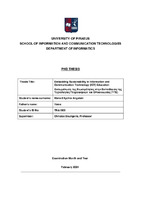Embedding sustainability in Information and Communication Technology (ICT) education
Ενσωμάτωση της βιωσιμότητας στην εκπαίδευση της Τεχνολογίας Πληροφοριών και Επικοινωνίας (ΤΠΕ)

Doctoral Thesis
Συγγραφέας
Angelaki, Maria Eftychia
Αγγελάκη, Μαρία Ευτυχία
Ημερομηνία
2024-02Επιβλέπων
Douligeris, ChristosΔουληγέρης, Χρήστος
Προβολή/
Λέξεις κλειδιά
Sustainability ; Sustainability in ICT ; Sustainable developmentΠερίληψη
Η Εκπαίδευση για τη Βιώσιμη Ανάπτυξη (ΕΒΑ) θεωρείται ως η εκπαίδευση που μπορεί να βοηθήσει και να υποστηρίξει τα νέα άτομα να αναπτύξουν στάσεις, δεξιότητες και γνώσεις προκειμένου να είναι σε θέση να λαμβάνουν καλά τεκμηριωμένες αποφάσεις για ένα βιώσιμο μέλλον. Η Πληροφορική διαδραματίζει θεμελιώδη ρόλο στην ΕΒΑ, καθώς υποστηρίζει σημαντικά την πρόσβαση σε πληροφορίες για τη βιωσιμότητα, και την ανάπτυξη καινοτόμων προϊόντων, εργαλείων και υπηρεσιών για αυτό το σκοπό. Ως εκ τούτου, η πρόκληση της σύνδεσης της βιωσιμότητας με την εκπαίδευση της Τεχνολογίας Πληροφοριών και Επικοινωνίας (ΤΠΕ) είναι επιτακτική για την ενίσχυση της μετασχηματιστικής μάθησης προς την ΒΑ. Για την αντιμετώπιση αυτής της πρόκλησης, ο γενικός σκοπός αυτής της διατριβής είναι να διερευνήσει και να συνεισφέρει νέα και γενικεύσιμα συμπεράσματα σχετικά με τις επιπτώσεις της ενσωμάτωσης της βιωσιμότητας στην εκπαίδευση ΤΠΕ στο ελληνικό εκπαιδευτικό σύστημα, συμπεριλαμβανομένης της ανώτερης δευτεροβάθμιας και τριτοβάθμιας εκπαίδευσης. Τα αποτελέσματα διερευνώνται μέσω δύο πρωτογενών ερευνών. Η πρώτη μελέτη ασχολείται με την άτυπη εκπαίδευση στην Ελλάδα. Ο στόχος είναι να διερευνήσει τον αντίκτυπο της χρήσης των εφαρμογών μεταφοράς για κινητές συσκευές στην ΕΒΑ μεταξύ των νέων ατόμων, τη δυνατότητα ενίσχυσης της περιβαλλοντικής συνείδησης και την πρόθεση ενεργού συμμετοχής σε βιώσιμες ταξιδιωτικές πρακτικές. Τα αποτελέσματα της μελέτης δείχνουν ότι υπάρχει μια θετική στάση από τα νέα άτομα απέναντι στην καθημερινή χρήση των εφαρμογών αυτών και μια προθυμία να αλλάξουν τις ταξιδιωτικές τους συνήθειες προς πιο βιώσιμες επιλογές. Η έρευνα αποκάλυψε επίσης ότι οι συμμετέχοντες/συμμετέχουσες ήταν πρόθυμοι/πρόθυμες να παρέχουν ανατροφοδότηση και να επιβραβεύονται για να αξιολογήσουν τον αντίκτυπο της συστηματικής χρήσης της εφαρμογής ώστε να βελτιώσουν τις προσφερόμενες ταξιδιωτικές υπηρεσίες. Πιο συγκεκριμένα, καταγράφεται μια ισχυρή σύνδεση μεταξύ της ενεργοποίησης για τη δοκιμή της εφαρμογής και της πιθανής συνέχισης της χρήσης της όταν οι συμμετέχοντες/συμμετέχουσες μπορούν να ανακαλύψουν περισσότερες βιώσιμες ταξιδιωτικές επιλογές και ταυτόχρονα να λαμβάνουν ανταμοιβές. Η δεύτερη μελέτη, ασχολείται με την τυπική εκπαίδευση στην Ελλάδα. Ο στόχος είναι να διερευνήσει τις γνώσεις των νέων ατόμων σχετικά με θέματα βιωσιμότητας, να αξιολογήσει τα αποτελέσματα της ενσωμάτωσης της βιωσιμότητας στα προγράμματα σπουδών ΤΠΕ καθώς και να διερευνήσει την πρόθεσή τους να ασχοληθούν με την πράσινη πληροφορική στην Ελλάδα. Επιπλέον, στοχεύει στη διερεύνηση της συμβολής της εκπαίδευσης στην περιβαλλοντική ευαισθητοποίηση των νέων ατόμων σχετικά με την εξοικονόμηση ενέργειας και τις πρακτικές διαχείρισης των ηλεκτρονικών αποβλήτων μέσα από μια εκπαιδευτική παρέμβαση για το σκοπό αυτό. Αναφορικά με τη δευτεροβάθμια εκπαίδευση η μελέτη δείχνει ότι η εκπαίδευση για την ευαισθητοποίηση σχετικά με την ανακύκλωση ηλεκτρονικών αποβλήτων είναι ζωτικής σημασίας για την απόκτηση περιβαλλοντικών δεξιοτήτων, συμπεριφοράς και στάσεων που συνάδουν με την προστασία του περιβάλλοντος και τη ΒΑ. Αν και οι γνώσεις των μαθητών/μαθητριών σχετικά με τη βιωσιμότητα ήταν ανεπαρκείς, ήταν πρόθυμοι/πρόθυμες να μάθουν περισσότερα και να ασχοληθούν με αυτή. Επιπλέον, οι μαθητές/μαθήτριες έδειξαν θετική αντίληψη για την πράσινη πληροφορική και την ενσωμάτωση της βιωσιμότητας στα προγράμματα σπουδών ΤΠΕ. Η έρευνα επίσης προτείνει ότι τα προγράμματα σπουδών ΤΠΕ θα πρέπει να επανασχεδιαστούν ώστε να ενσωματωθούν οι αρχές της βιωσιμότητας. Αναφορικά με την τριτοβάθμια εκπαίδευση, τα αποτελέσματα της μελέτης υποδηλώνουν ότι αν και η πλειονότητα των φοιτητών/φοιτητριών είχε ελλιπές επίπεδο κατανόησης της έννοιας της βιωσιμότητας λόγω της εμφανούς αδυναμίας ενσωμάτωσης σχετικών θεμάτων στην εκπαίδευση ΤΠΕ στην Ελλάδα, μετά από την εκπαιδευτική παρέμβαση έδειξε σημαντική αύξηση της γνώσης σχετικά με τη βιωσιμότητα και τις περιβαλλοντικές επιπτώσεις της ΤΠΕ. Σε κάθε περίπτωση, τα αποτελέσματα της μελέτης αποκαλύπτουν ότι οι φοιτητές/φοιτήτριες δεν είναι ικανοποιημένοι/ικανοποιημένες με τη συμβολή του πανεπιστημίου στην ΕΒΑ. Επίσης, η έρευνα παρέχει πληροφορίες για τα ελληνικά πανεπιστήμια ώστε να αναπροσανατολίσουν τα προγράμματα σπουδών ΤΠΕ προκειμένου να ενσωματώσουν θέματα βιωσιμότητας. Επιπλέον, τα ευρήματα αποδεικνύουν ότι η άμεση επίδραση της εκπαίδευσης στην πρόθεση των φοιτητών/φοιτητριών να ασχοληθούν με τη βιωσιμότητα ήταν σημαντική. Η πρόθεση αυτή μπορεί να ενισχυθεί μέσω πρακτικών προσανατολισμένων στη βιωσιμότητα που εφαρμόζουν τα πανεπιστήμια και θα μπορούσε να υποστηριχθεί περαιτέρω με την προσφορά και εφαρμογή προγραμμάτων επιβράβευσης των φοιτητών/φοιτητριών.


